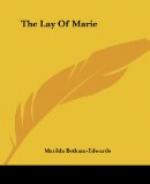“The air
reviv’d her—but again
She left not, for the social
train,
The stillness of her chamber;—ne’er
Its threshold pass’d,
but on her bier:
Spoke but to one who seem’d
to stand
Anear, and took his viewless
hand,
To promise, let whate’er
betide,
She would not be another’s
bride.
Then, pleading as for past
offence,
Cried out aloud, ’They
bore me hence!
My feet, my lips, refus’d
to move,
To violate the vows of love!
My sense recoil’d, my
vision flew,
Almost before I met thy view!
Almost before I heard thee
cry
Perfidious Osvalde! look and
die!
“’Oppose
them? No! I did not dare!
I am not as a many are,
Ruling themselves: my
spirits fly,
My force expires before reply.
Instinctively a coward, free
In speech, in act, I could
not be
With any in my life, but thee!
Nor strength, nor power do
I possess,
Except, indeed, to bear distress!
Except to pour the aching
sigh,
Which only can
my pain relieve;
Inhuman ye who ask me why,
And pause, to
wonder that I grieve:
Mine are the wounds which
never close,
Mine is a deep,
untiring care;
A horror flying from repose,
A weight the sickening
soul must bear.
The tears that from these
eyelids flow,
The sad confusion
of my brain,
All waking phantoms of its
woe,
Your anger, and
the world’s disdain,—
Seek not to sooth me!—they
are sent
This feeble frame
and heart to try!
It is establish’d, be
content!
They never leave
me till I die!’
“So little
here is understood,
So little known the great
and good,
The deep regret that Eustace
prov’d,
Brought home conviction that
he lov’d
To many: others thought,
her dower,
The loss of lordships, wealth,
and power,
Full cause for sorrow; and
the king
Hop’d he might consolation
bring,
And bind a wavering servant
o’er,
(Not found too loyal heretofore,)
By linking his sole daughter’s
fate
In wedlock with an English
mate—
His favourite too! whose own
domain
Spread over valley, hill,
and plain;
Whose far-trac’d lineage
did evince
A birth-right worthy of a
prince;
Whose feats of arms, whose
honour, worth,
Were even nobler than his
birth;
Who, in his own bright self,
did bring
A presence worthy of a king—
A form to catch and charm
the eye,
Make proud men gracious, ladies
sigh;
The boldest, wisest, and the
best,
Greater than each presuming
guest;—
I speak from judgment, not
from love,—
In all endowments far above
Who tastes this day of festal
cheer,
And whom his death assembles
here!




